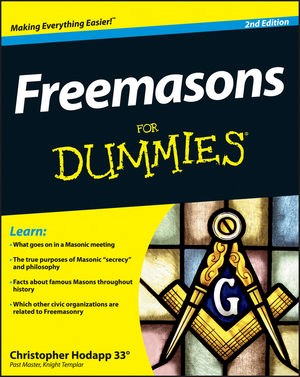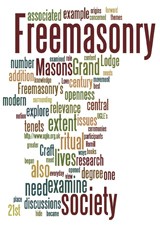Communicating Christ in a Multicultural World
9. Freemasonry
Lesson Objectives
Understand what the main "Christian-related" cults teach, how people are drawn to then, and how to reach followers with the Gospel. In this lesson, we will study Freemasonry.
Introduction
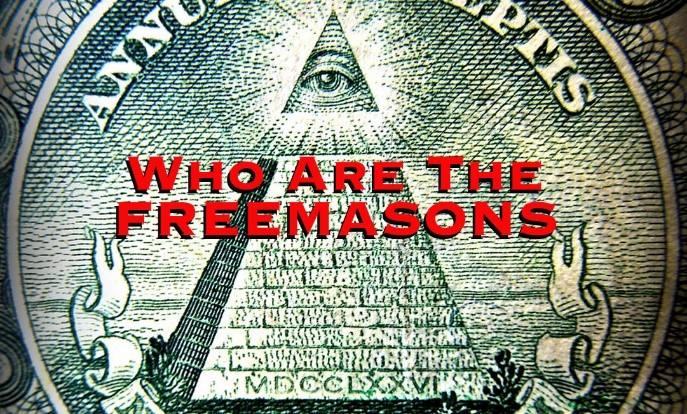
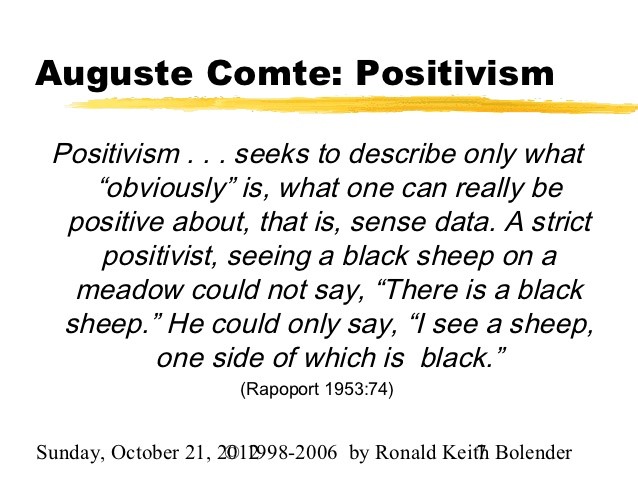
Who are the Freemasons?
One of the largest/oldest fraternal organisations in the world.
Freemasons arrived in Australia with the First Fleet (1788) and up until quite recently were shrouded in secrecy and tightly maintained traditions. Freemasonry is technically not a religion, but members must believe in a supreme being. In its heyday most members were either Protestants or Jews. They are now faced with declining membership.
Full title: Free and Accepted Masons. National/local names, eg United Grand Lodge of England, Grand Lodge of Antient, Free and Accepted Masons of South Australia.
Personal Links and Experiences
The paternal grandfather of Ps Allan Davis was a freemason in early days but renounced the movement as a cult and burned his apron. His uncle was a practicing Freemason all his working life. Freemasonry is functioning in Canberra. A senior executive member of the Foreign Affairs Department told Ps Allan that if he wanted to go above a certain level in the department he would need to be a Freemason.
Check out the list of famous Australians who were/are celebrated as Freemasons by the movement in Australia:
http://www.lodgedevotion.net/devotionnews/education-editorial-articles/famous-australian-freemasons/large-list-of-notable-and-famous-australian-freemasons
Origins
Many rituals of Masonry stem from cathedral building from the 900s to the 1600s, when masons (stoneworkers) formed associations called guilds in European cities and towns. Freemasons were stoneworkers who travelled from community to community. They had organisations, sometimes referred to as lodges. With the decline of cathedral building in the 1600s, many of the Masonic organisations became social societies. Began accepting members who had never been stoneworkers, and called them speculative masons.
In 1717, four fraternal lodges, which may have been originally founded as masons' organisations, united under the Grand Lodge of England. The Masons of today consider the formation of the Grand Lodge of England to be the beginning of their organised society. Spread to other countries, and included such famous people as Benjamin Franklin, Frederick the Great of Prussia, Wolfgang Amadeus Mozart, George Washington, Voltaire and Joseph Smith (the death of Smith was allegedly linked to Masons and membership of any Lodge since then has been grounds for excommunication from the Mormon church).
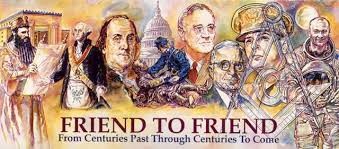
Freemasonry was strongly linked to the Enlightenment concepts of deism and equality. The strongest rites that emerged were the Scottish and the York. Soon came to be linked ceremonially to the Knights Templar, the Teutonic Knights and Knights Hospitalier of Saint John (Knights of Malta). Became avidly anticlerical and advocates of social and political reform. British Freemasonry organised into Irish, Scottish and English grand lodges. In the late 18th century split; the Antients and Moderns formed.
British colonists took Freemasonry to North America. Some historians believe it may have been Masons who staged the Boston Tea Party in 1773. After 1832, the American Masons abandoned their political activities, and the organization assumed the social and fraternal character it has today. Southern US Masons disenfranchised by the Civil War and the loss of their slaves allegedly formed the Ku Klux Klan in the 1860s. The All-Seeing Eye of Masonry became the Grand Cyclops of the KKK. Hand signs, handshakes, secret oaths were adopted from Masonic experience.
Many US Presidents (eg Ronald Reagan, Bill Clinton) and men of high office in the US and UK (including leading Anglican churchmen and allegedly 40% of Southern Baptist ministers) have been Masons.
In Continental Europe freemasonry has vied with Roman Catholicism (Masonic affiliation has been proscribed, or forbidden, for Roman Catholics since Clement Xll's encyclical In eminenti in 1738). The Knights of Columbus (est 1.3 million members worldwide) was established as the Catholic alternative to Freemasonry.
In Australia, USA and Canada grand lodges are organised at State/provincial levels. Bodies linked the Freemasonry include: Ancient Arabic Order, Nobles of the Mystic Shrine and the Order of the Eastern Star.
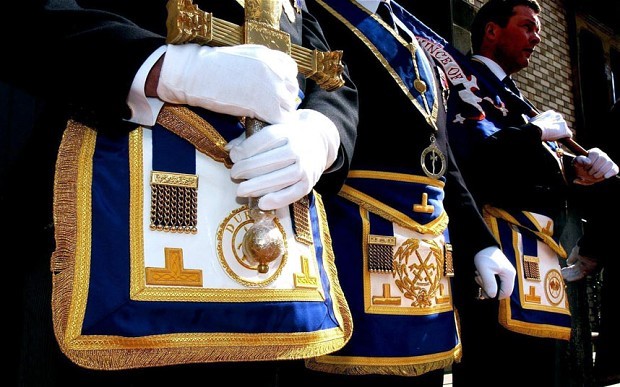

Claims
Freemasonry claims that it abides by Three Great Principles:
- brotherly love
- tolerance and respect for opinions of others
- charity
Moral and Fraternal
"It is made up of men who are concerned with oral and spiritual values, who are seeking a better way of life (SA order)." Freemasonry promotes morality in which all men agree to be good men and true." Examples: high moral standards; kindness in the home; honesty in business; courtesy in society; fairness in business dealings.
Ecumenical
"Freemasonry treats all men as equal, regardless of race, religion or social standing, building strong bonds of friendship between men of like beliefs who otherwise have remained strangers. This claim has a strong appeal across-classes and cross-culturally. Freemasonry offers a strong sense of fraternal "belonging", which many men crave.
There are women's chapters, but they do not have the same recognition within the movement.
Brings together men of varied religious beliefs, political opinions, and ranks. Does not sponsor any particular denomination of faith.
Discussion of politics at Masonic meetings is forbidden."
Theistic
"Freemasons share a common belief in a Supreme Being, but Freemasonry goes beyond religious boundaries, bringing together men from every country, sect and opinion in peace and harmony.' Masons call God the "Great Architect of the Universe." Men of any religion that professes belief in one God may join. -some faiths forbid their members becoming Masons.
Secular
"Freemasonry is not a substitute for religion or the church; it reinforces individual beliefs."
Open
Freemasonry is not a secret society. Freemasons can be seen in the community every day and their halls are clearly marked." Reject suggestions of "secrecy", claiming private rituals and modes of recognition are based on signs used in the Middle Ages to protect membership.
Benevolent
"Freemasons, by their very nature, are involved in acts of benevolence and charity, but freemasonry is not a charity". Masons donate money to hospitals; homes for widows, orphans, the aged; relief for people in distress; and scholarships for students.
Educational
"Teaches morality and lawfulness, develops self-discipline in thought and action, in communicating and dealing with one's fellows. Encourages the understanding, appreciation and use of the English language.'
Civic
Freemasonry demands respect for the civil law of the country in which a man works and lives.
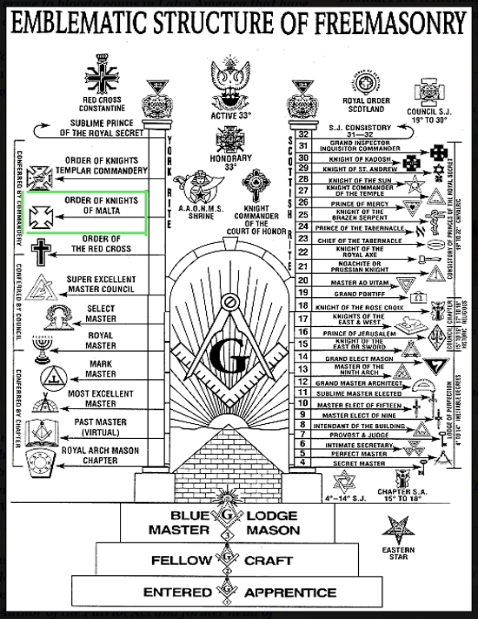
Rituals
Masons have symbolical secrets ... like trade secrets passed on by stonemasons to their apprenticeships." Used for initiation and passage from one degree to another.
Most symbols and rituals are based on tools and practices of the building professions. At times, Masons dress in elaborate, colourful costumes, and take part in dramatic rituals, many of which are secret to all except members. Some of the mystical ideas that have been woven into Masonic ritual are related to the building of Solomon's temple, Gothic traditions (eg Regius Manuscript, c. 1390), the Flood, or the building of the Egyptian pyramids.
Membership
Men who wish to become Masons must apply for membership. They are not invited to join. Most apply through a friend who is a member.
After a man has been accepted, he joins a Blue Lodge, the basic organisation of Masonry. Members of Blue Lodges may hold three "degrees". Each degree in Masonry teaches moral lessons. To earn the degree, a Mason must learn the lessons and participate in a ceremony that illustrates them. After a Mason acquires the third degree in a Blue Lodge, he may receive further degrees.
Three stages symbolically represent candidate's progress from darkness to light.
- apprentice
- fellow craft
- Master Mason
The Masons have become one of the world's largest fraternal organizations. Today, there are an estimated 5 million Masons in the world.
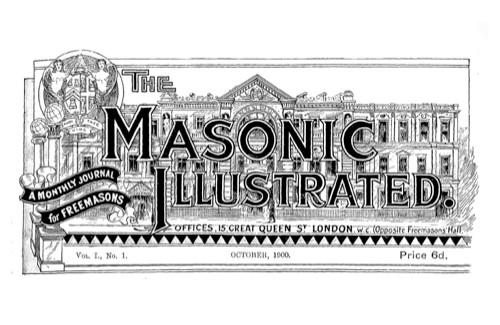
"Problems" with Freemasonry
Theism Really Deism
Definition of "God" stemmed from deism of the 18th century.
God, "by whatever name he is known", or religion are not allowed to be discussed at meetings. This means that a Muslim, Hindu, Orthodox Jew, can be a Mason, in practice. Even belief in the ancient Egyptian gods such as Osiris.
"The Temple and the Heavens are presided over by the Triune Deity, the Three Persons of the Divine Triunity. This Trinity of persons is well known in all the world religions, for example, Shiva, Vishnu and Brahma.
In Masonry this same Triplicity is known as the Most High, the Grade Geometrician and the Great Architect of the Universe". (Luis Trust, The Spirit of Masonry, quoted in the Scottish Rite Journal.) The Trinity represents the cyclical concepts of creation, preservation and destruction."
Unitarian
"Masonry, around whose altars the Christian, the Hebrew, the Moslem, the Brahman. the followers of Confucius and Zoroaster, can assemble as brethren and unite in prayer to the one God must needs leave to its initiate to look for the foundations of his faith for the written scriptures of his own religion"
(Albert Pike, in Morals and Dogma, p. 226 - a book recommended by the Masonic Magazine New Age. Pike was an acknowledged Luciferian and encouraged other Sovereign Grand Inspectors General to teach Brethren of the 31st, 32nd and 33rd degrees the "purity of the Luciferian Doctrine", ie that Lucifer is God).
Blasphemous
During the ceremony for the ritual of the Royal Arch degree the candidate is asked, "Brother Inspector, what are you?" and he replies, "I AM that I AM (the name of God in Exodus 3).
Rosicrucians claim they were established by Masonic orders in Europe.
Rosicrucianism (literally Red Cross) is a sect that claims it is not religious. Members believe Jesus was "one of earth's greatest teachers", along with Mohammed, Buddha, Plato, the Hindu gods, and others. Followers believe that Christ was not a person but a spirit who took possession of the physical body of Jesus. Every man possesses the Christ spirit.
Freemasonry is, "a worship in which all good men may unite, including Unitarians, Hindus, Jews, nominal Christians, Muslims, Theosophists, etc. We only pursue the Universal Religion."
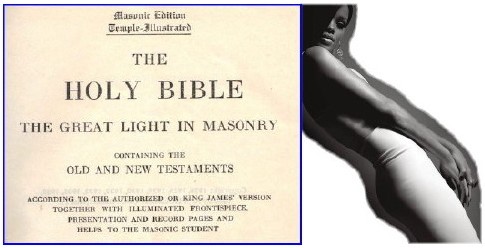
In Australia the Bible is used the ceremonial purposes. In other countries the Koran, Veda, etc. are used. "The Bible is only one chapter of a great volume, all equally God's word."
At the 16th degree, of the Scottish Rite, the secret name revealed to Masons is Abaddon (another name for Satan, in Revelation 9: 11).
Based on Fear
As the degrees advance, the penalties invoked by participants increase, eg, for the first degree. One's tongue is torn from its roots; for the second one's heart; or the third one's bowels. Participants pray that it may be so.
Based on Mysticism
"Today we are at the threshold of a new era. All signs point to this fact. We look forward to a transformation into a New Age using the insight and wisdom of the ancient mystics and the mysticism of Eastern religions." (Henry Clausen, 33rd degree, former Grand Master of Freemasonry, in Emergence of the Mystical)
Freemasonry may well acknowledge the existence of God, but a different religion is involved.
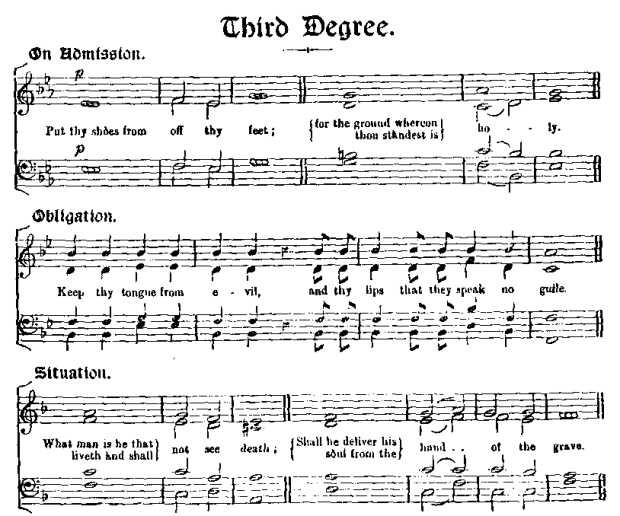
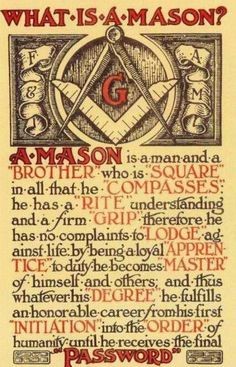
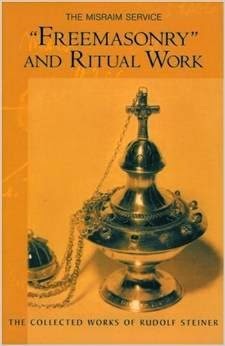
APPROACHING MASONS:
- Can a Mason be a Christian? Yes, but a Christian cannot remain a Mason.
- How can a Christian can remain in an organisation that accepts the ancient mystery-religions, is syncretistic, compromises the uniqueness of Christ as God and Saviour, is blasphemous in its rites and is probably Luciferian at the highest levels.
- Christians cannot be unequally yoked with unbelievers - 2 Corinthians 6: 14-18 Salvation is only in Jesus Christ - John 14:6; Acts 4:12.
- The love of God can cast out all fear, including power to break spells Masons invoke as they progress through the degrees.
- In Christ all curses are defused, nullified.
- The only valid work of the heavenly "Architect" is the Gospel:
"Jesus is 'the stone you masons threw out, which is now the cornerstone.' Salvation comes no other way; no other name has been or will be given to us by which we can be saved, only this one." (Acts 4: 11-12)
"Using the gift God gave me as a good architect, I designed blueprints; Apollos is putting up the walls. Let each carpenter who comes on the job take care to build on the foundation! Remember, there is only one foundation, the one already laid: Jesus Christ." (1 Corinthians 3:10, 11).
Some Excerpts from Masonic Teaching
Key document: "Morals and Dogma of the Ancient and Accepted Scottish Rite of Freemasonry, " By Albert Pike, Grand Commander, 1859-1891. Prepared for the "Supreme Council of the Thirty-Third Degree and Published by its Authority" Originally published in 1871, excerpts from 1966 Edition (still current).
"(Masonry)... "The custodian and depository (since Enoch) of the great philosophical and religious truths, unknown to the world at large, and handed down from age to age by an unbroken current of tradition, embodied in symbols, emblems and allegories." (p. 210)
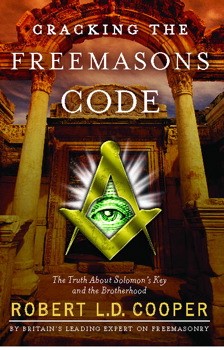
"Every Masonic Temple is a Temple of Religion, and its teachings are instructions in religion." (p. 213)
"[Masonry] reverences all the great reformers. It sees in Moses, the lawgiver to the Jews, in Confucius and Zoroaster, in Jesus of Nazareth, and in the Arabain Iconoclast, great teachers of morality, and eminent reformers, and allows every brother of the order to assign to each such higher and even divine characteristics as his creed and truth require." (p. 525)
"Everything good in nature comes from OSIRIS - order, harmony, and the favorable temperature of the seasons and celestial periods." (p. 476) [Osiris was the ancient Egyptian god whose annual death and resurrection personified the self-renewing vitality and fertility of nature. The "All Seeing Eye" is a representation of Osiris.]
Masonic ritual is concerned with the recovery of the "Lost Word," presumed to be the name of God - supposedly lost through the murder of the architect, Hiram Abiff, during the building of Solomon's Temple. This quest is attained during the ritual of the royal arch degree. It is here that the secret name of the deity of masonry is revealed. That name is "JAOBULON." "JAO" is the Greek word for Jehovah. "BUL" is a rendering of the name BAAL. "ON" is the term used in the Babylonian mysteries to call upon the deity "Osiris". The secret ritual book of the Craft prints the letters J.B.O. It states that: "We three do meet and agree - in peace, love and unity - the Sacred Word to keep - and never to divulge the same - until we three, or three such as we - do meet and agree."
Oath swore by the Entered Apprentice of first degree:
"Binding myself under no less penalty than that of having my throat cut across, my tongue torn out by its roots, and my body buried in the rough sands of the sea, at low-water mark." The Master Mason swears, " ...under no less penalty than that of having my body severed in two, my bowels taken from thence and burned to ashes, the ashes scattered before the four winds of heaven... "
Duncan's Ritual of Freemasonry by Malcolm Duncan, Third Edition, pages D. McKay Publishing Co., N. Y, pp. 36, 39
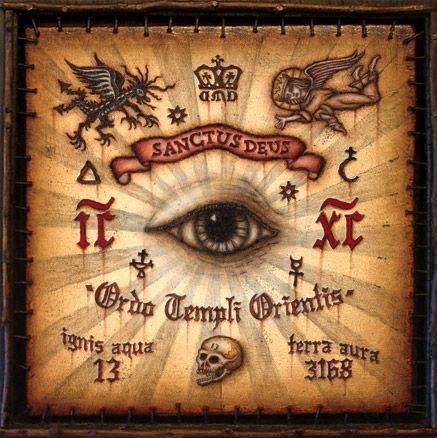
"The true Mason is not creed-bound. He realizes with the divine illumination of his lodge that as a Mason his religion must be universal: Christ, Buddha or Mohammed, the name means little, for he recognizes only the light and not the bearer. He worships at every shrine, bows before every altar, whether in temple, mosque or cathedral, realizing with his truer understanding the oneness of all spiritual truth." The Lost Keys of Freemasonry, Manly P. Hall, 33rd, Macoy Publishing and Masonic Supply Co. Richmond, Va., 1976, p. 35)
"When the Mason learns that the Key to the warrior on the block is the proper application of the dynamo of living power, he has learned the Mystery of his Craft. The seething energies of Lucifer are in his hands and before he may step onward and upward, he must prove his ability to properly apply [this] energy." (Ibid. p. 48)
"Within the pages of the Holy Bible are found those principles of morality which lay the foundation upon which to build a righteous life. There are three guiding lights - the Bible, the perfect square and the extended compass". Masonry .. invites to its altar men of all faiths, knowing that, if they use different names for the "Nameless One of a hundred names", they are ... reading the same vast Book of the Faith of Man. With us the Bible is supreme. What Homer was to the Greeks, what the Koran is to the Arabs, the grand old Bible is to us". Introduction to Masonic Bible
